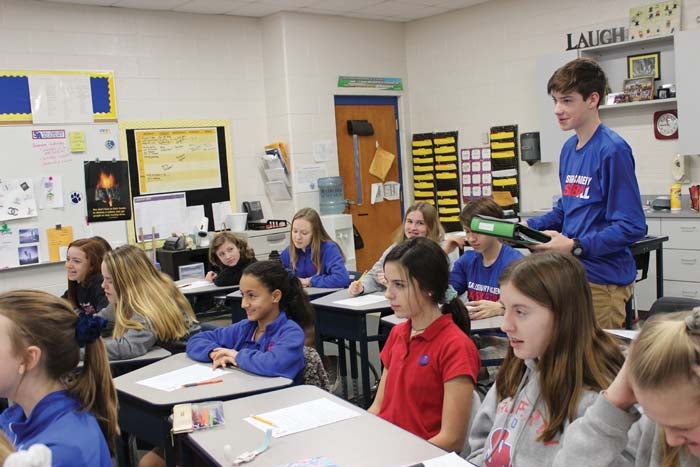Salisbury Academy students present Lincoln’s first inaugural address
Published 12:00 am Thursday, April 18, 2019

- Salisbury Academy eighth-grader Nate Shaffer practices his lines from Lincoln’s First Inaugural Address. The students chose this speech for its relevance to current events.
History came to life for eighth-grade students at Salisbury Academy as they studied and presented President Abraham Lincoln’s first inaugural address in a video project as part of Ford’s Theatre’s Lincoln Online Oratory program.
“It’s a new, fun and innovative way to learn speaking skills and history – completely hands-on and mostly student driven,” said Bailey Zino, an eighth-grader at Salisbury Academy.
After being selected for the Lincoln Online Oratory Project by Ford’s Theatre, students were tasked with electing the Lincoln speech that most spoke to them and could be performed best based on content, historical relevance, and current significance. They chose Lincoln’s first inaugural address for its pertinence to current events.
“It was so impactful when the students realized how relevant these speeches are to our current day,” said Heather Coulter, curriculum director and faculty liaison for the project.
Students were coached by a Ford’s Theatre teaching artist on how to effectively present the speech as a class and create an edited video as a final product.
“Students always benefit when they can learn from an expert, and the time with their teaching artist was especially effective,” Coulter said.
Ford’s Theatre teaching artist Victoria Reinsel, who worked with the class over three video conference sessions, said the students’ investment in the message and significance was evident in her Skype lessons with them.
“Students were enthusiastic, open to feedback and willing to connect with the text,” said Reinsel.
Over the course of their time studying and practicing the speech, students learned how speaking, writing, rhetorical devise, explication, and historical significance are woven together.
“Sometimes history seems hard for students to relate to their lives,” said Coulter. “This project provided opportunities to really examine where, when and why Lincoln was including specific allusions and elements in his speech.”
Takeaways for the students included the excitement of working with a professional actor, building public speaking skills, and making connections with a person, place and time in history.
“We got to learn about Lincoln and really know how he felt and what he was thinking during this time in our country’s history,” said eighth-grader Lucy Woods.
In a similar takeaway, student Elsie Richter, editor for the video project, said, “The project was hands-on and allowed us to be ourselves while reliving history and learning about Abraham Lincoln.”
“I came away from the experience as a better speaker with confidence in speaking in front of others,” said Damian Brandon, who especially enjoyed the public speaking aspect.
The Salisbury Academy Lincoln Online Oratory Project can be viewed on the Ford’s Theatre website and on the Salisbury Academy homepage at salisburyacademy.org.
That a speech from 1861 can so effectively energize today’s students demonstrates how the experiential study of history can inspire, challenge and provide critical connections to the past, said Coulter.
For eighth-grader Kaylan Lowe and her classmates, the lesson is one that they will take with them for years to come.
“Saying a line in a very important speech in history is better than just reading a textbook and answering questions,” said Lowe. “You get involved and learn so much more by doing it yourself.”


